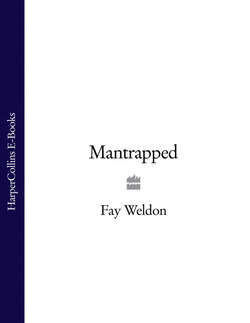Читать книгу Mantrapped - Fay Weldon - Страница 7
Riches to rags
ОглавлениеI came to the riches to rags idea in a taxi on my way to a commissioning meeting at the BBC. That was 1985. I was unprepared. I would have to wing it, and did. ‘Well,’ I said, ‘there was this woman living happily in the country when…’ and made it up as I went along. Okay, they said. These days I would need to take along a twenty-page synopsis, fully-illustrated, to such a meeting and the life would have gone out of it before I even began. That was The Heart of the Country, which ended up as a TV mini-series and which I later novelised. Frivolity can be a great asset to a writer: delinquency is part of the calling. I thought it would only really interest recipients of housing benefit in the Shepton Mallet area of Somerset, where I then lived, but it ended up winning the LA Times Fiction Prize. A great many people are very conscious of riches to rags; it is their fear and, more often than you would think, their experience.
There was an auction in that novel, too, when my heroine’s belongings were sold up. Bereft of a husband to protect her, and innocent of the ways of the world, she was thoroughly cheated by the local small businessmen, from the antique dealer to the estate agent to the lawyer. First they slept with her, then they profited by her. Trisha will not be so foolish. She knows only too well which side her bread is buttered.
That auction is vivid in my mind because, having written it, I was there at its filming for TV. If you write enough fiction, you can have trouble telling the difference between what you did in real life and what you wrote, and filming makes both more vivid. The rectangle of charred earth where I once fictionally burned down my own home, in a novel called Worst Fears, written in 1995, is seared painfully into my mind, and the passing of ten years has not muted the pain. I drove past the house the other day and was astonished to see it still standing and was not at all pleased.
Nearly everything you write about, you realise one day, has its roots somewhere in the past. What, for example, is this preoccupation with mattresses? True, this morning I changed my own. Over, end to top, side to side, heavy work. I did it myself without help. I did not want witnesses. There is no mattress-cover. Perhaps I am piling my own housewifely guilt into poor Trisha. I am reluctant to go out and buy a new one: I don’t know what kind of shop stocks such things and I would have to find tape, pen and paper to take the measurements and I am upstairs and they are downstairs—you know how it goes. And besides, I have other more pressing things to think about. Easier to write another paragraph about Trisha’s life.
My mattress, like Trisha’s, is nine years old and expensive. Unlike Trisha’s it is in not too bad a state. But mattresses are not the proper stuff of fiction. Beds are trivial on the page, if not in life. When, after thirty years of marriage, doing what all women are warned not to do (Wronged wife: ‘I want nothing from you, nothing. All I want is my freedom!) I left the matrimonial home, my then husband at least had the grace to give our brass bed away and not share it with his mistress under what used to be our joint roof. I am grateful for that.
Sometimes I wonder who has the bed now—like in that story A Day in the Life of a Penny, which all children used to be required to write and I loved to do and others to my surprise hated. In whose pocket is the penny now? In whose home the bed?
I hope it brought them luck, I daresay it did. Luck stayed with me for perhaps longer than its usual run, and may it do the same for them: I cross my fingers. I also hope that though keeping the bed itself they junked the mattress. It had nearly thirty years of life with us, and heaven knows where it came from before.
We do so much in bed, lying down—if we are lucky, that is—get born, conceive others, die—and if it doesn’t happen in a bed that’s usually bad. Born in a taxi, conceived in an alley, died in an accident—needs must, but bed is best, safe, familiar and dull. Too dull, perhaps, for novels. Fiction is about the exceptional, not the normal. Fiction is focused real life, with the boring bits cut out. Otherwise, just live life, don’t read about it. Let alone write about it. Back to business.
